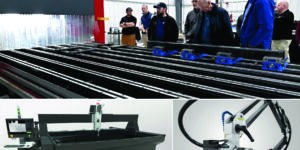AWS Releases New Technical Standards
The new standards provide specifications for applying zinc thermal spray coatings to steel reinforced concrete and reaffirm safety procedures for robotic arc welding.
Posted: August 11, 2016
The American Welding Society (AWS; Miami, FL), a non-profit organization dedicated to advancing the science of welding, has released two new technical standards:
AWS C2.20/C2.20M:2016, Specification for Thermal Spraying Zinc Anodes on Steel Reinforced Concrete, covers the application of zinc thermal spray coatings to steel reinforced concrete, using arc and flame spray equipment. The use of thermal spraying for corrosion control on reinforced concrete has been used as far back at 1983 by the California Department of Transportation, the Florida Department of Transportation, and the Oregon Department of Transportation. This publication is formatted for industrial process instructions and includes information on job descriptions, safety, equipment, surface preparation, thermal spraying, and quality control.
AWS D16.1:2004 (R2016), Specification for Robotic Arc Welding Safety, is a reaffirmation of the 2004 standard which includes minor editorial changes. The standard establishes safety requirements with respect to the design, manufacture, maintenance, and operation of arc welding robot systems. It also helps to identify and prevent hazards involved in all aspects of robotic arc welding systems.
Both standards are now available for purchase by clicking here.
AWS C2.20/C2.20M:2016 is $68 for non-AWS members and $48 for members. AWS D16.1:2004 (R2016) is $64 for non-AWS members and $51 for members.
AWS was founded in 1919 as a multifaceted, nonprofit organization with a mission to advance the science, technology and application of welding and allied joining and cutting processes worldwide, including brazing, soldering, and thermal spraying. Headquartered in Miami and led by a volunteer organization of officers and directors, it serves more than 73,000 members worldwide and is composed of 22 districts with 250 sections and student chapters.














